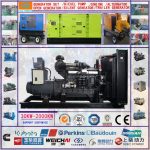Introduction
In remote areas where access to the main power grid is limited or non-existent, diesel generators play a crucial role in providing reliable and continuous power supply. These generators are highly versatile and can be used in a wide range of applications, from powering small cabins and homes to serving as backup power sources for critical infrastructure such as hospitals and telecommunication towers. In this article, we will explore the various aspects of diesel generators for remote power supply, including their working principles, advantages, disadvantages, maintenance requirements, and environmental impact.
Working Principle of Diesel Generators
Diesel generators operate on the principle of converting diesel fuel into mechanical energy, which is then transformed into electrical energy. The basic components of a diesel generator include an engine, alternator, fuel system, cooling system, exhaust system, and control panel. When the generator is started, the diesel engine ignites the fuel in the combustion chamber, causing the pistons to move and generate mechanical energy. This mechanical energy is then used to rotate the alternator, which produces electricity through the process of electromagnetic induction.
Advantages of Diesel Generators for Remote Power Supply
1. Reliability: Diesel generators are known for their reliability and durability, making them ideal for remote locations where power outages are common. These generators can run continuously for long periods without experiencing issues, providing a stable source of power.
2. Fuel Efficiency: Diesel fuel is more energy-dense compared to other fuels, such as gasoline, resulting in higher fuel efficiency and lower operating costs. This is particularly important in remote areas where fuel availability may be limited.

3. Easy Maintenance: Diesel generators are relatively easy to maintain, with fewer moving parts compared to other types of generators. Routine maintenance tasks such as oil changes, filter replacements, and inspections can help ensure the generator operates efficiently and reliably.
4. Longevity: Diesel generators are built to last, with many models having a longer lifespan compared to other types of generators. This longevity makes them a cost-effective investment for remote power supply applications.
5. Power Output: Diesel generators are capable of producing high power output, making them suitable for powering a wide range of equipment and appliances in remote locations.
Disadvantages of Diesel Generators for Remote Power Supply
1. Noise and Emissions: Diesel generators are known for their noise and emissions, which can be a concern in remote areas where environmental impact is a consideration. Proper installation and maintenance can help mitigate these issues.
2. inquiry : Diesel generators tend to have a higher upfront cost compared to other types of generators, which can be a barrier for some users in remote locations with limited budgets.
3. Fuel Storage: Diesel fuel needs to be stored on-site, which can be a logistical challenge in remote areas with limited infrastructure. Proper fuel storage and handling practices are essential to ensure the generator operates safely.
4. Environmental Impact: Diesel generators emit pollutants such as nitrogen oxides (NOx) and particulate matter, which can contribute to air pollution and have negative effects on human health and the environment. Implementing emission control technologies and using cleaner fuels can help reduce the environmental impact of diesel generators.
Maintenance Requirements for Diesel Generators
Proper maintenance is essential to ensure the reliable operation of diesel generators for remote power supply. Some key maintenance tasks include:
1. Regular Inspections: Routine inspections of the generator, including checking for leaks, loose connections, and signs of wear and tear, can help identify potential issues before they escalate.
2. Oil Changes: Regular oil changes are essential to keep the engine lubricated and running smoothly. The frequency of oil changes will depend on the generator's usage and operating conditions.
3. Filter Replacements: Air, fuel, and oil filters should be replaced at regular intervals to ensure the generator's engine is protected from contaminants and operates efficiently.
4. Cooling System Maintenance: The cooling system, including the radiator and coolant levels, should be checked regularly to prevent overheating and ensure proper engine operation.
5. Battery Checks: The generator's battery should be inspected and tested periodically to ensure it is holding a charge and able to start the generator when needed.
6. Load Testing: Regular load testing can help ensure the generator can handle the required electrical load and operate efficiently under varying conditions.
Environmental Impact of Diesel Generators
While diesel generators offer many benefits for remote power supply, they also have environmental implications that need to be considered. The combustion of diesel fuel produces emissions such as carbon dioxide (CO2), nitrogen oxides (NOx), sulfur dioxide (SO2), and particulate matter, which can contribute to air pollution and climate change. To mitigate the environmental impact of diesel generators, several measures can be taken:
1. Emission Control Technologies: Installing emission control technologies such as diesel particulate filters (DPF) and selective catalytic reduction (SCR) systems can help reduce the emissions of harmful pollutants from diesel generators.
2. Cleaner Fuels: Using cleaner fuels such as ultra-low sulfur diesel (ULSD) or biodiesel blends can help reduce the emissions of sulfur dioxide and particulate matter from diesel generators.
3. Proper Maintenance: Regular maintenance of diesel generators, including tuning the engine for optimal performance and efficiency, can help reduce emissions and improve fuel efficiency.
4. Energy Efficiency: Implementing energy-efficient practices such as load management, using energy-saving equipment, and optimizing generator operation can help reduce fuel consumption and emissions from diesel generators.
Conclusion
Diesel generators play a crucial role in providing reliable and continuous power supply in remote areas where access to the main power grid is limited. While diesel generators offer many advantages, such as reliability, fuel efficiency, and ease of maintenance, they also have environmental implications that need to be addressed. By implementing proper maintenance practices, using emission control technologies, and adopting cleaner fuels, the environmental impact of diesel generators can be minimized. Overall, diesel generators remain a viable and cost-effective solution for remote power supply applications, ensuring essential services and infrastructure have access to reliable electricity.
